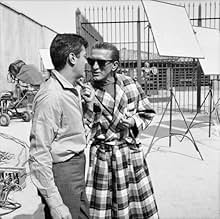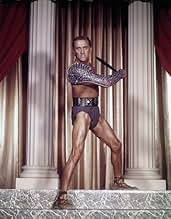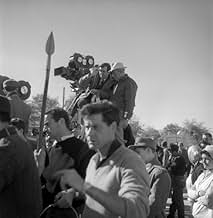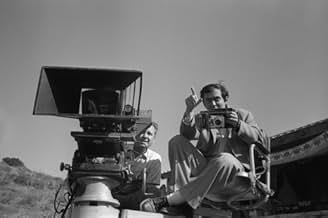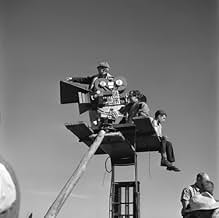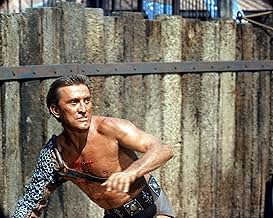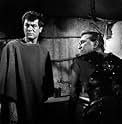El esclavo Spartacus dirige una violenta revuelta contra la decadente República Romana.El esclavo Spartacus dirige una violenta revuelta contra la decadente República Romana.El esclavo Spartacus dirige una violenta revuelta contra la decadente República Romana.
- Ganó 4 premios Óscar
- 12 premios ganados y 11 nominaciones en total
Nick Dennis
- Dionysius
- (as Nicholas Dennis)
Argumento
¿Sabías que…?
- TriviaStanley Kubrick was brought in as director after Kirk Douglas had a major falling out with the original director, Anthony Mann. According to Sir Peter Ustinov, the salt mines sequence was the only footage shot by Mann.
- ErroresA map of Italy can be seen in Spartacus' camp tent (it is prominently featured in the scenes involving the pirate emissary), which is far too accurate for the times of the movie.
- Citas
Herald: I bring a message from your master, Marcus Licinius Crassus, Commander of Italy. By command of His Most Merciful Excellency, your lives are to be spared. Slaves you were and slaves you remain. But the terrible penalty of crucifixion has been set aside on the single condition that you identify the body or the living person of the slave called Spartacus.
Antoninus: [stands up] I'm Spartacus!
[everyone around Antoninus and Spartacus stands up and shouts "I'm Spartacus!"]
- Créditos curiososThe six main cast members are accompanied by an item that represents their character (a chain, a Roman eagle, a wine jug, a couple of hands - one wielding a snake, and a sword).
- Versiones alternativasAfter its premiere the film was heavily cut and wasn't shown in its complete form until 1991, when a restored version was re-released. Among the restored scenes is one where where Marcus Crassus (Laurence Olivier) tries to seduce Antonius (Tony Curtis) in the bath. The soundtrack was damaged, so Anthony Hopkins was called in to dub Olivier's lines. In addition, several scenes of violence preview audiences reacted to negatively were restored, including Crassus bloodily stabbing Draba, Marcellus being drowned in the stew, Spartacus stabbing a Roman soldier in the pool, and several gory shots in the final battle, notably Spartacus lopping off the arm of a Roman soldier.
- ConexionesEdited into Hércules: Los viajes legendarios: Les Contemptibles (1997)
Opinión destacada
From what little I've read of this film it was lucky to have been made at all. Some very big talents had some very big egos and those egos clashed repeatedly. Original director Anthony Mann was replaced by Stanley Kubrick by Producer/Star Kirk Douglas among other clashes.
But the result was all worth it. The stars all give top notch performances, but the mark of a really great film is the memorability of each individual in the ensemble. To give a few examples, Charles McGraw as the sadistic trainer at the gladiatorial school, John Dall as Sir Laurence Olivier's protégé, and John Ireland as Kirk Douglas's fellow gladiator trainee are all memorable in the brief roles they have.
Kirk Douglas wisely opts for a straightforward interpretation of a hero in the title role of Spartacus. He's a BC everyman, born into a world which hadn't heard anything about human rights, he knows and feels he's not just cattle. Catch the alternating scenes of Douglas and Sir Laurence Olivier addressing the slave army and the Roman Army. Olivier with his years of Shakespearean training coming across as the tyrant to be, and Douglas in simple prose talking about the slaves fighting for their hopes and dreams. Very effective.
The plot concerns a revolt at a gladiatorial school which mushrooms into a crisis for the Roman Empire. Political factions led by Olivier as Crassus and Charles Laughton as Gracchus seek to use the slave revolt to further their own ends.
Laughton as always is a wonder. It's a bit of unusual casting for him because his parts are usually those of very tortured souls. His Gracchus is a sly rogue, but a decent man. One of my favorite movie lines of all time is delivered by him addressing the Roman Senate where he says he'll "take a little republican corruption for a little republican freedom."
Another sly rogue in the film is Peter Ustinov who won the first of his two Oscars as Batiatus the owner of the gladiatorial school. Like so many others I'm sure in those days, he's just trying to come out on the winning side when doing so could be a life or death situation.
Jean Simmons as Varinia, beloved of Spartacus, has the only woman's part of any substance. But when was Ms. Simmons bad in anything. One of the most underrated and under-appreciated actresses in the history of film.
The lessons about man's desire for freedom and to control his own destiny are eternal and valid. And this film will be also.
But the result was all worth it. The stars all give top notch performances, but the mark of a really great film is the memorability of each individual in the ensemble. To give a few examples, Charles McGraw as the sadistic trainer at the gladiatorial school, John Dall as Sir Laurence Olivier's protégé, and John Ireland as Kirk Douglas's fellow gladiator trainee are all memorable in the brief roles they have.
Kirk Douglas wisely opts for a straightforward interpretation of a hero in the title role of Spartacus. He's a BC everyman, born into a world which hadn't heard anything about human rights, he knows and feels he's not just cattle. Catch the alternating scenes of Douglas and Sir Laurence Olivier addressing the slave army and the Roman Army. Olivier with his years of Shakespearean training coming across as the tyrant to be, and Douglas in simple prose talking about the slaves fighting for their hopes and dreams. Very effective.
The plot concerns a revolt at a gladiatorial school which mushrooms into a crisis for the Roman Empire. Political factions led by Olivier as Crassus and Charles Laughton as Gracchus seek to use the slave revolt to further their own ends.
Laughton as always is a wonder. It's a bit of unusual casting for him because his parts are usually those of very tortured souls. His Gracchus is a sly rogue, but a decent man. One of my favorite movie lines of all time is delivered by him addressing the Roman Senate where he says he'll "take a little republican corruption for a little republican freedom."
Another sly rogue in the film is Peter Ustinov who won the first of his two Oscars as Batiatus the owner of the gladiatorial school. Like so many others I'm sure in those days, he's just trying to come out on the winning side when doing so could be a life or death situation.
Jean Simmons as Varinia, beloved of Spartacus, has the only woman's part of any substance. But when was Ms. Simmons bad in anything. One of the most underrated and under-appreciated actresses in the history of film.
The lessons about man's desire for freedom and to control his own destiny are eternal and valid. And this film will be also.
- bkoganbing
- 5 mar 2005
- Enlace permanente
Selecciones populares
Inicia sesión para calificar y agrega a la lista de videos para obtener recomendaciones personalizadas
Detalles
- Fecha de lanzamiento
- País de origen
- Sitio oficial
- Idioma
- También se conoce como
- Spartacus
- Locaciones de filmación
- Hearst Castle, San Simeon, California, Estados Unidos(Crassus' villa)
- Productora
- Ver más créditos de la compañía en IMDbPro
Taquilla
- Presupuesto
- USD 12,000,000 (estimado)
- Total en EE. UU. y Canadá
- USD 1,830,650
- Fin de semana de estreno en EE. UU. y Canadá
- USD 92,162
- 28 abr 1991
- Total a nivel mundial
- USD 1,846,975
- Tiempo de ejecución3 horas 17 minutos
- Color
Contribuir a esta página
Sugiere una edición o agrega el contenido que falta

Principales brechas de datos
What is the streaming release date of Espartaco (1960) in Canada?
Responda




